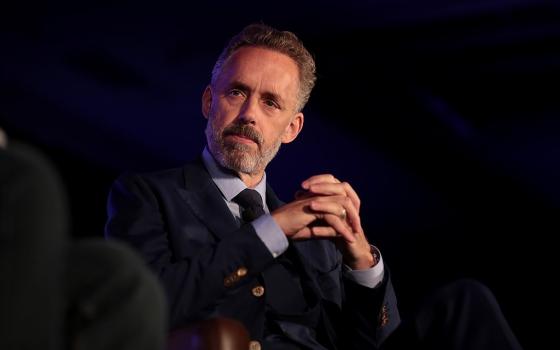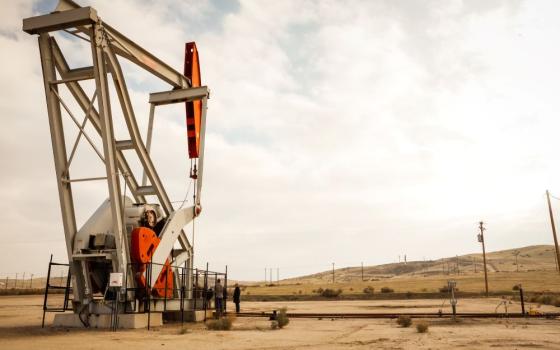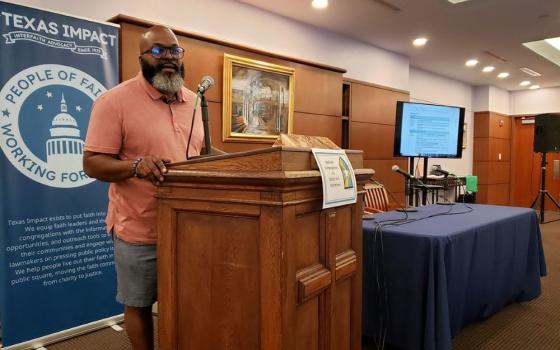
A shopper browses at a vegetable market in London Feb. 3, 2017. (CNS photo/Peter Nicholls, Reuters)
Editor's note: This story originally appeared in Sentient Media. It is republished here as part of NCR's partnership with Covering Climate Now, a global collaboration of more than 250 news outlets to strengthen coverage of the climate story.

Many are unsure of the steps they should take to assist in reducing the consequential impacts of climate change. While altering your diet completely may seem extreme, Meatless Monday paves the way for dietary change that will have a lasting effect on the food system and the planet.
The history of Meatless Monday
Meatless Monday was first introduced by the U.S. Food Administration during World War I in an effort to reduce the consumption of staple meal items and aid in the war. Nearly 13 million families signed on. The campaign was continued during World War II by President Franklin D. Roosevelt, and then continued by President Harry S. Truman in post-war restoration efforts.
In 2003, Meatless Monday was revived by Sid Lerner in association with the Johns Hopkins Bloomberg School of Public Health’s Center for a Livable Future. Although the movement was formerly used as a wartime aid, the idea was reestablished as a health campaign benefiting one's well-being and mitigating environmental impact. Additionally, Meatless Monday is part of The Monday Campaigns, creating health initiatives with John Hopkins, Columbia and Syracuse Universities.
Widespread support of this global movement is bringing omnivores and herbivores together one day out of the week in an attempt to improve their health, save the planet, and any other myriad of reasons for taking part in this day.
Meatless Monday and climate change
While experts offer a multitude of different factors contributing to climate change, such as fossil fuel emissions in the industrial and transportation sectors, a highly underreported cause is that of animal agriculture. Animal agriculture is contributing at least 37% of total greenhouse gas (GHG) emissions. This farming contributes more GHG emissions than the fossil fuels burned to power all planes, cars, boats, trains, buses, and other vehicles.
Animal agriculture includes over one trillion aquatic animals and over 82 billion land animals raised and slaughtered yearly for human consumption. With this many animals being raised and slaughtered, we must also take into account the land used to raise them, the waste they create, the water and grain used to feed them, and the transportation methods utilized to bring them to the slaughterhouse.
Acknowledging the recent Intergovernmental Panel on Climate Change (IPCC) report from the United Nations, it is evident that a key role in reducing one’s impact on the climate crisis, is by reducing meat consumption. The report notes that without changes to the current food system, the negative consequences we have already began facing, will only worsen. Meatless Monday is bringing this possibility to global citizens, offering them a simple way to begin combating the climate crisis.
Advertisement
By going meatless just one day per week, you are decreasing your meat consumption by nearly 15 percent, decreasing the environmental consequences associated with meat production, too. Another way to look at it is like this: If the entire U.S. did not eat meat or cheese for just one day a week, it would be the equivalent of not driving 91 billion miles --- or taking 7.6 million cars off the road, says the Earth Day Network.
Where are Meatless Mondays?
Advocates for healthy, plant-based eating have spread awareness surrounding Meatless Monday and successfully brought the movement to schools, hospitals, restaurants and many other settings where reduced meat intake is making a tremendous impact, even if just one day a week.
K-12 school systems offering free breakfast or lunch have brought on Meatless Monday in an attempt to bring students healthier options, when they may not already be provided to them.
Notably, New York City Mayor Bill de Blasio, Schools Chancellor Richard A. Carranza, and Brooklyn Borough President Eric Adams, announced in March 2019 that NYC would adopt Meatless Monday across every public school in the city. Thus, kindergarten-aged students, up to seniors in high school, will be exposed to plant-based options throughout their youth. This menu shift will impact 1.1 million students every Monday, which is over 79 million meatless meals per school year.
"Reducing our appetite for meat is one of the single biggest ways individuals can reduce their environmental impact on our planet," said Mark Chambers, director of the New York City Mayor's Office of Sustainability. "Meatless Mondays will introduce hundreds of thousands of young New Yorkers to the idea that small changes in their diet can create larger changes for their health and the health of our planet."
On a global scale, Monday is active in over 40 countries and regions. Countries like Germany, India and Brazil are just a few countries that have popularized vegetarian eating one day per week. Thursday Veggie Day in Ghent, Belgium is another example of prodigious support of this movement. Research states that 43 percent of Belgians are eating less meat due to this initiative, and 28 percent of people are becoming vegetarian by starting with Thursday Veggie Day.
Joining the movement
There are an abundance of ways to join the movement, getting started is the first step. By creating your own Meatless Monday campaign, you can bring meatless options to your school, community, or even your country, every Monday. One meatless day per week adds up to be much more for the fight to counter climate change.
Create a campaign today.






